Interview with Jan Munk, a veteran of SS Regiment 'Westland' (Wiking) and SS Division 'Nibelungen', London, 1988.
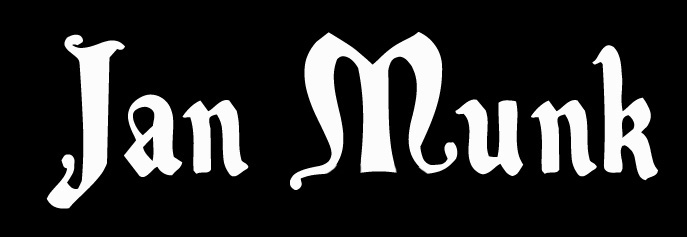
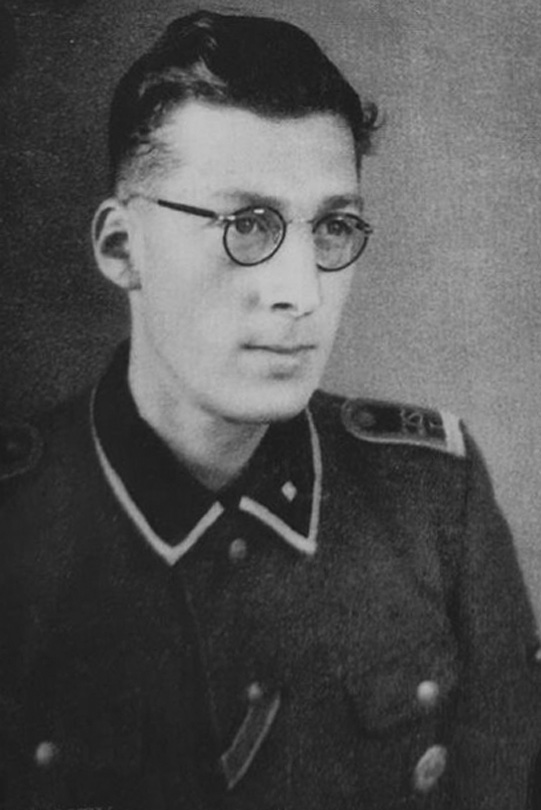


Interview with Jan Munk, a veteran of SS Regiment 'Westland' (Wiking) and SS Division 'Nibelungen', London, 1988.




Jan: My short answer is personal experiences. I grew up in a family that always admired the German nation. Even though we were different tribes, we had a lot in common, and my father always pointed that out. The Dutch have always looked to Germany as a sort of big brother, so to speak, as the Germans have always been very friendly with our people. I remember one time in particular where my family drove into Germany to go to a favorite spot; I believe it was during a welcoming of spring festival. I saw German girls dressed up, and the HJ [Hitler Jugend, or Hitler Youth] doing a parade. The beauty of the girls in their BDM [Bund Deutscher Mädel, or League of German Girls] uniforms, and costumes took me in.
Seeing the flags flying in the wind really added to the appeal.
We ate, and I was straining to hear the speakers, but I could hear them talk about duty to the people and nation, love of country and God. From the little I could hear, it left a deep impression on me. A very pretty girl walked by in a BDM uniform and winked at me, which only added to my amazement. My family was much less impressed; they admired Germans, but could not understand National Socialism.
In May 1940 Germany invaded my country to prevent the Allies from mounting an attack on Germany. At first, there was an air of resentment about this, but it quickly died down when the Germans moved on, it was as if we had never been invaded. A Dutch model of National Socialism took control, and I was impressed to see the same order come to my nation as was in Germany. I decided I would enlist in the SS as I saw in them the elite of Europe. The alarm was sounding in regards to communism, and its desire to move west by force.
How did the Germans treat you and the other volunteers?
Jan: I felt we were treated very well. There may have been a few Germans who looked down on us, who felt National Socialism was only a German thing, but they were quickly silenced. I was sent for my basic military training and was with many other Dutchmen. The Germans were very happy to have us in this fight and many let us know it. They would buy us beers, and always spoke about how all of Europe would be better standing united. That was the dream for which we fought, not to conquer as is claimed today.
The only time I can remember when a German was rude to us, was a bloke in Bad Tölz, who wanted us to feel beneath the Germans, like our contributions to the war did not matter. We volunteers then made shields representing our flags and wore them on our tunics. This made big waves and he was told to change his way of thinking. We were all one people, uniting to defend our common heritage.
[Above: Two Dutch SS posters - 'Europa is Aangetreden!' (Europe has United!)]
How did the Dutch feel when Germany bombed Rotterdam? I know the Allies made this into a war crime.
Jan: Yes, the people were appalled and angry when it happened, but what the Allies fail to mention was the German post bombing response. They quickly moved in all available resources to start rebuilding, made it clear it was a mistake due to a failure of communications, and paid all the victims handsomely. The Allies caused far more destruction and causalities via their own bombing raids on Dutch territory. They keep it hidden pretty well, who would know Arnhem was almost leveled due to Allied shelling and bombing. Thousands of Dutch people died from Allied bombings, but not a peep today is heard.
You fought on the Russian front with Westland, what was your impression of the Russian soldier?
Jan: I shared the German view that the Russians had been turned into slaves to their system, but could not understand why they fought so hard until I saw them in action. It is true that they had political officers who would shoot any soldier who refused to attack, and they lived under fear that loved ones would be sent away if they failed to perform. The same fanatical mentality they cast on the National Socialism state, which was false as the Germans did not fault families for a soldier's failure.
They seemed like animals most of the time, no discipline, and not very intelligent. I once saw a POW holding area, where food was being handed out, and some pushed their way forward to take food from others. The Russian guard helpers we had beat them with whips to get them to stop. What is amazing is that the Germans then allowed these men to enlist in an army of liberation, or adopted as helpers who wanted to avoid a POW camp. This was very common and hard to fathom as they made poor soldiers.
I also found them to be very cruel; thanks to the hateful propaganda they were fed every day. From the very outset of Barbarossa, they were told Germans were raping, looting, and killing their way across the motherland. Therefore, they were exalted to exact revenge in any way possible. They killed prisoners, tortured for information, and used dirty tricks. They were notorious for using dum-dum rounds, where they cut the tip off the bullet to cause more injury. They also used illegal incendiary exploding rounds.
I can say I was always impressed with how they were armed; the PPSh-41 was a very good weapon. They were better armed than we were many times. I was always impressed with the amount of armor they possessed. We had better Panzers later, but the Russians could overwhelm our tiny forces with no problems, they just had to take many losses to do it. I will dispel a myth for you. We did not look upon the Russians as sub-humans; we got along well with the civilians. We tended to feel sorry for them, as their regime kept them poor and hungry. We stayed with them many times, and we shared what we had. Many villages adopted the sons of Europe as their own.
The SS is accused of horrible war crimes, especially in the east regarding civilians. Did you see any of this?
Jan: Depends on what you call a war crime. It is popular today to label German reprisals as war crimes. People are ignorant in the nature of war and military operations. There are a few photos that show what appear to be civilians hanging, or being shot as examples of German evilness. What people are not told is these people most likely committed a crime. We did not just grab people and execute them, careful attention to the rules of war were followed. Some areas had partisan attacks to deal with.
Wiking was a frontline combat division, and anyone who tried to sabotage to disrupt our movements were turned over to the police. If that were not possible, a company grade officer would preside over a quick trial to hear facts, and then pronounce sentence. One curious incident was during our retreat from Ukraine; a young girl flattened the tire of a staff car with a knife, and was seen by the commander. He went out and grabbed her. Brought her in for questioning, it was revealed she had a crush on our IA officer and did not want him to leave. She could have been shot; instead, it was arranged for her family to be moved back to Germany to avoid the wrath of the Russians.
We had very good relations with the Russian people, some may have been cold to us, but most viewed us as liberators. War is cold and evil sometimes though, and what I did see was the auxiliaries or army of liberation use harsh measures on partisans. They fought as if they were settling old scores with the people who supported the Bolsheviks. Early on I saw them help conduct anti-partisan operations and they took no prisoners it appeared. However, I must say the partisans made the rules and everyone else followed their examples.
The German armed forces had very strict codes they lived by, cheating, thievery, and harsh measures were not permitted. If anyone chose to break the rules, they were sent to penal battalions where it was harsh. You received very dangerous missions to clear your name.
[Above: A Dutch Waffen-SS volunteer wearing the 'Westland' cuff title.]
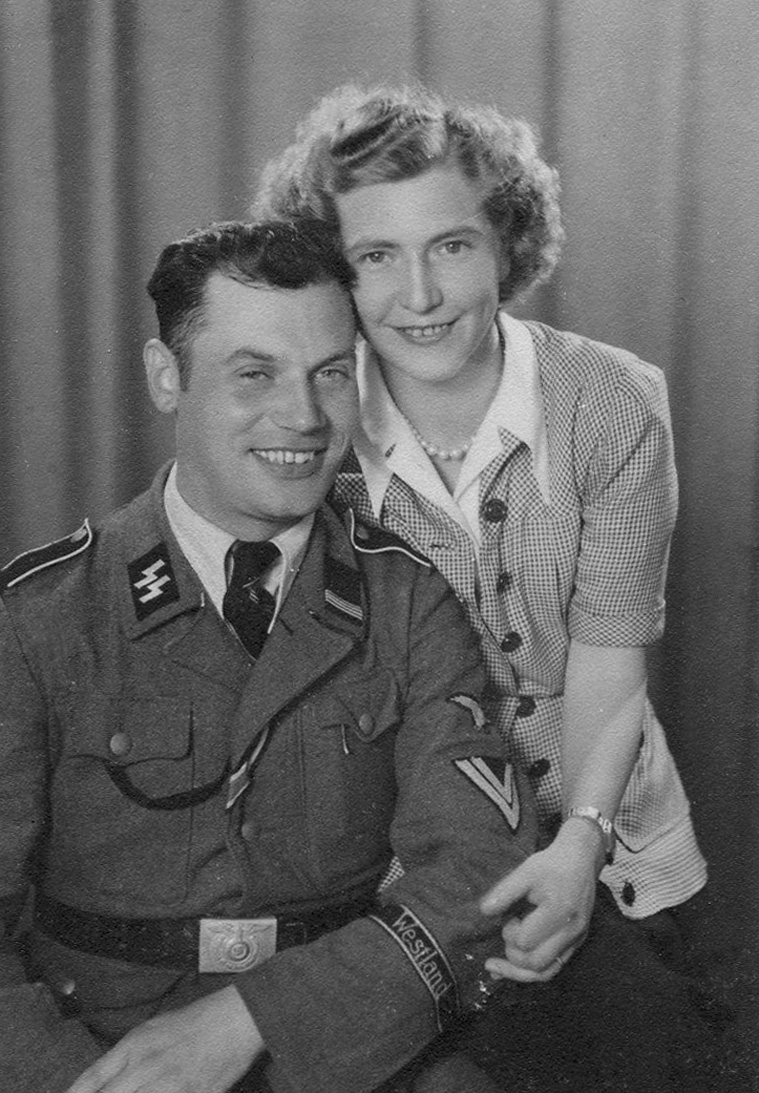
Were you ever harassed back at home?
Jan: No, not while the National Socialist government was in place. The people were not like what they want you think today. Many were happy to help the Germans, as we knew they were looking out for the best interests of Europe. Allied agents who landed and tried to stir up the people caused the only resistance. They were always turned in so that by 1942 I think the Allies stopped sending them. It was not until the Normandy landings that a resistance formed, again led by Allied agents.
My father did not always approve of me and he made that known so even after the Allied occupation they were not bothered much. Some die-hard communists wanted them arrested but others stepped in to intervene. The end of the war was not kind to those who aided the Germans; they were attacked, harassed, and even killed. The women who had relations with Germans were raped, beaten, and shaven by communist thugs or opportunists trying to step over each other to show how much they liked the Allies.
Can you share what the fighting was like on the eastern front?
Jan: It was hard. Russia is hot in the summer, wet in the spring, and very cold in winter. Germany smashed open the front in 1941, capturing huge amounts of supplies and men who were to be used in an offensive against the west. Before Moscow, and I personally know men of the [Das] Reich made it into the suburbs of Moscow, the Russians launched a huge offensive with soldiers they had in reserve and drove the Germans back very far.
From then on the best divisions were always used in hot spots, or we called these fire brigades. We would be rushed to stop a breakthrough, and our CO liked to always hit them in the flank. This way we could try to trap the enemy and force a surrender. The Russians were not very disciplined so usually this was easy to do, except in cases when the odds were too great. In one encounter, we united with [Das] Reich and Totenkopf defeating a large Russian tank army. We only had a handful of working Panzers, but still knocked out almost the whole army, their losses were enormous.
Combat was hard, the Russians always started an attack with massed artillery fire, then large waves of screaming infantry, and sometimes partisans would attack our rear at the same time. We were always understrength and it was sheer will that held the line, we inflicted terrible losses on the enemy. The longer the war went on the bloodier the fighting. The Russian soldier also became dirtier and less military looking. Prisoners we took in 1945 looked more like street beggars than soldiers.
The level of cruelty got worse as the war went on, in towns we would retake the Russians always left dead civilians no matter what country it was, even their own. They considered everyone collaborators and took a terrible toll. We would then counterattack even harder to exact revenge on the regiments responsible.
[Above: Jan Munk (left).]
[Above: SS-Standarte 'Westland' in Munich, October 1940.]
[Above: Two books written by Jan Munk.]
[Above: Jan Munk, an old warrior, undefeated. May 18, 1996.]
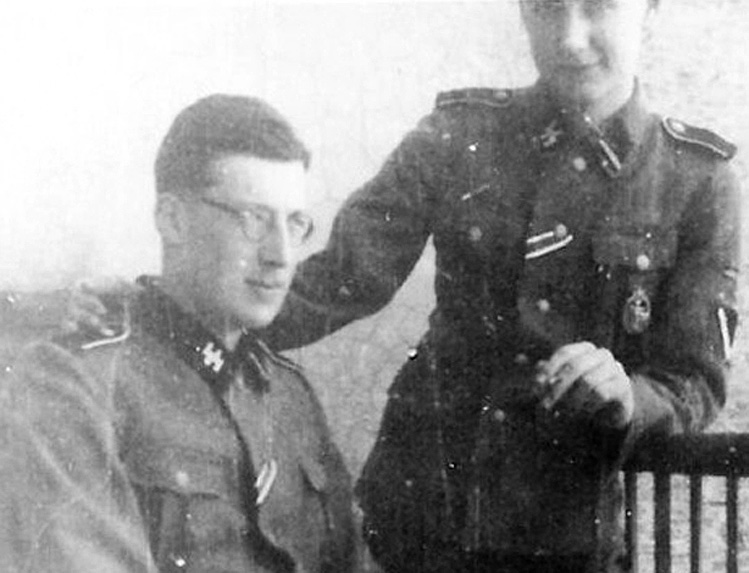
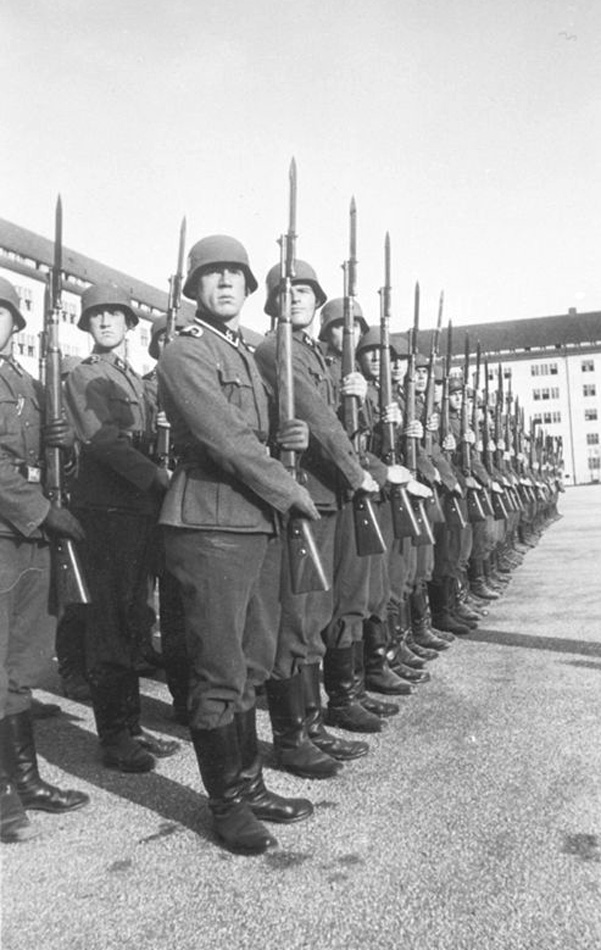
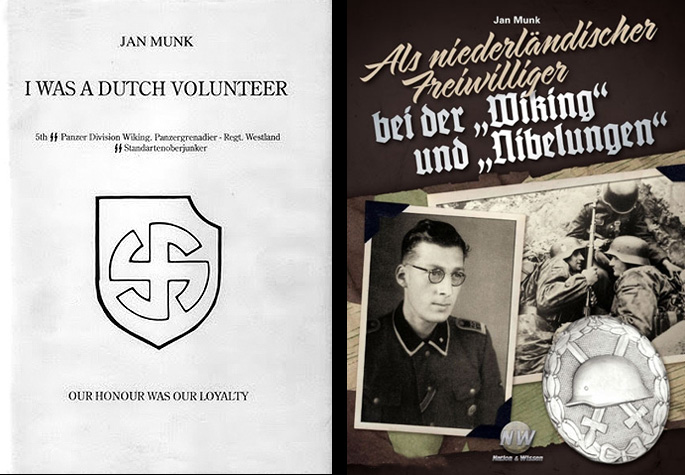
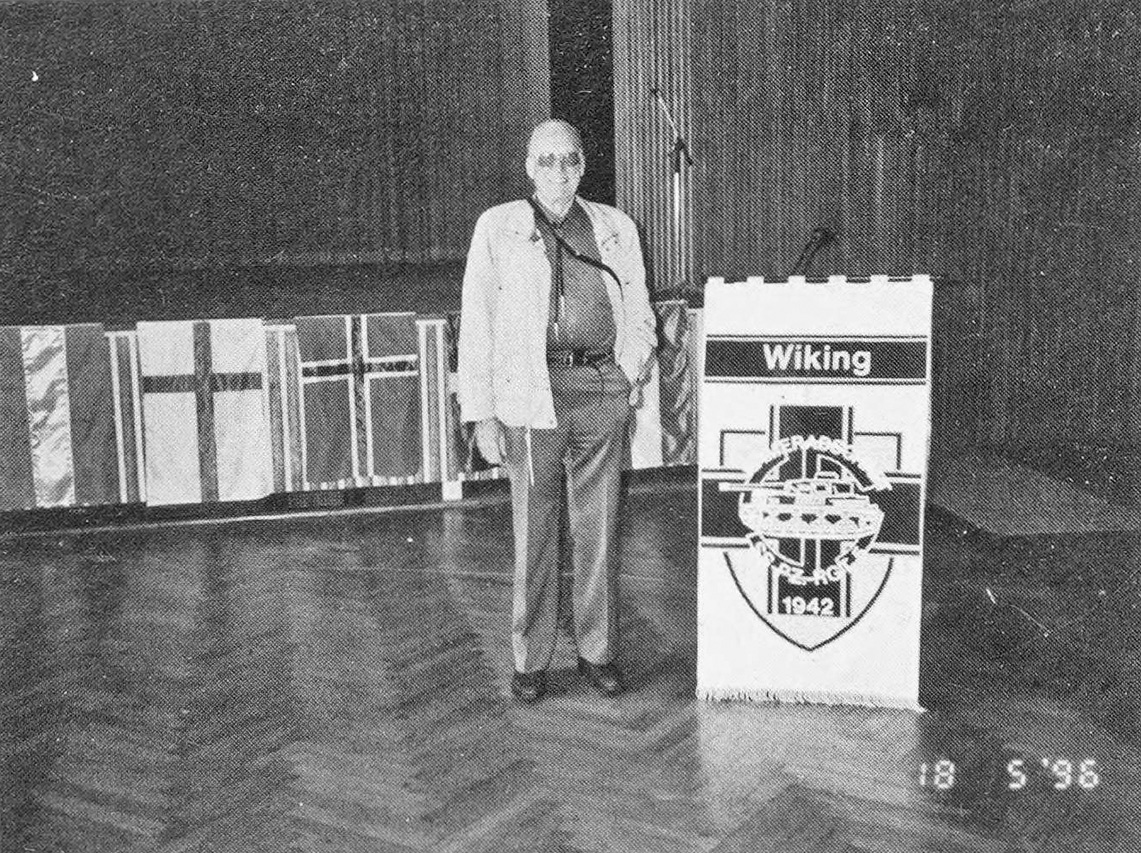
Back to Interviews